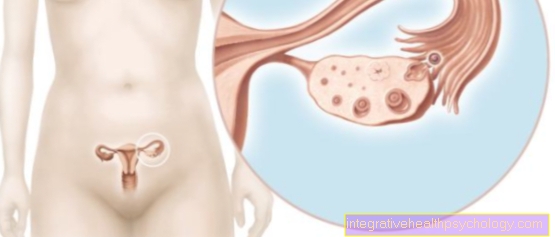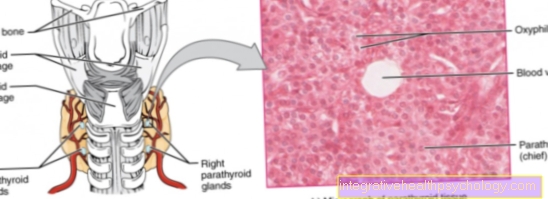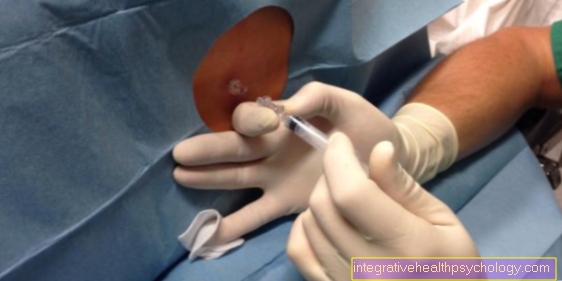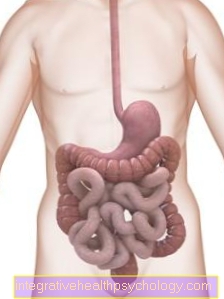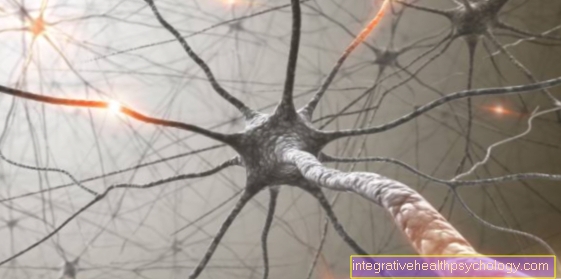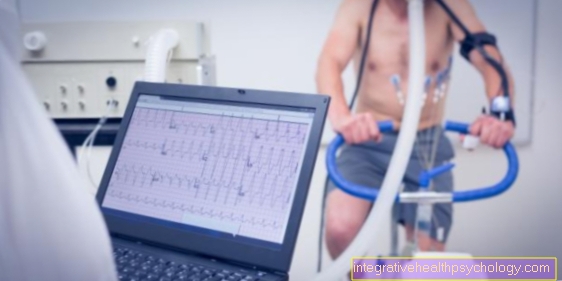Multiple organ failure
definition
Multi-organ failure (MOV) is the simultaneous or rapid failure of several vital organs. It is an acutely life-threatening situation. The kidneys, liver and lungs are particularly affected.
In addition to multi-organ failure, there is also the so-called multi-organ dysfunction syndrome (MODS) in which there is a restriction, but not a complete failure, of several organ functions.

causes
Multiple organ failure can have many different causes. The most common reasons are poisoning of the blood caused by bacteria, so-called sepsis, as well as multiple trauma caused by accidents, in which several body regions or organs are injured at the same time.
Another reason can be an allergic reaction that can lead to anaphylactic shock.
Heart failure can also trigger multi-organ failure, since the heart is often not able to provide the amount of blood the body needs.
The causes mentioned lead to a state of shock.In the event of a shock, the body's circulation is paralyzed, so the oxygen supply to the tissues of the organs via the bloodstream is no longer ensured (Please also read: Symptoms of shock).
Other reasons for multiple organ failure are cancer, old age and alcohol addiction.
A chain reaction often takes place in multiple organ failure, with the failure of one organ leading to the failure of another, and so on.
Sepsis / blood poisoning
Sepsis is a complex, systemic inflammatory reaction triggered by bacteria circulating in the blood or, more rarely, fungi. It is a common cause of multiple organ failure and is a life-threatening situation.
Read more about this on the main page: Blood poisoning
Sepsis is triggered by an infection, but the misdirected response of the immune system to the infection is responsible for the course of the disease and the resulting failure of organ functions.
The signs of sepsis can be very variable depending on the organ involvement. Often one finds fever, impaired consciousness, an increased pulse and chills. It can also go into septic shock, which is also associated with low blood pressure. This paralyzes the body's circulation and the organs cannot be adequately supplied with blood and oxygen.
Read more about these topics: Symptoms of blood poisoning and therapy for blood poisoning
In principle, any infection, e.g. Pneumonia, urinary tract infection or an abscess can lead to sepsis.
Sepsis is an emergency and must be treated immediately. It is important to find the location and the causative agent of the infection in order to be able to treat it specifically with antibiotics.
Alcohol consumption
Frequent alcohol consumption in large quantities can also lead to multiple organ failure.
Read more on this topic: Consequences of alcohol consumption
As a detoxification organ, the liver is particularly badly affected by alcohol abuse. The liver tissue is remodeled and this gradually leads to a loss of function (liver insufficiency) up to complete failure of the liver. Clotting factors are also made in the liver. If this is missing, the bleeding tendency increases. Even small injuries can then be dangerous and larger ones lead to bleeding to death more quickly.
Furthermore, the heart and the brain are affected, which can be irreversibly damaged by regular alcohol consumption.
cancer
The actual cause of death if you have cancer frequently a Multiple organ failure. Cancer cells multiply uncontrollably and the affected organs can gradually no longer fulfill their function until they are finally complete to fail. Examples of this are lung cancer or liver cancer.
Many types of cancer also have this property Metastases to form, i.e. to attack organs other than those of their origin. Colon cancer, for example, primarily metastasizes to the liver and lungs, and lung cancer primarily to the brain, liver and bones. This leads to the timely Failure of several organs.
diagnosis
Depending on which organs are affected, there are different charactersconfirming the diagnosis of multiple organ failure. It is important that at least two organs at the same time or fail in quick succession.
Since a multi-organ failure mostly results from a serious illness or a serious accident, the admission of the patient to a Intensive care unit make necessary, the diagnosis is often made there too. Here can go special technique and trained personnel the loss of function of an organ can often be quickly recognized and treated.
Concomitant symptoms
There are no typical symptoms for multi-organ failure, as it depends on which organs are affected, different effects may have. Blood poisoning (sepsis), a common cause, is associated with fever, impaired consciousness and a high pulse, but here too the symptoms can vary.
A Hepatic insufficiency shows through Jaundice, Clotting disorders and Impaired consciousness.
A Damage to the lungs by a faster breathing, Shortness of breath and bluish discolored skin and mucous membranes (cyanosis).
A acute kidney failure by Storage of water in the lungs and brain, high blood pressure, as well as blood in the urine and a small amount of urine.
A patient with multiple organ failure often comes into shock, for example due to high blood loss or sepsis. The Shock symptoms consists of a drop in blood pressure and an increase in heart rate. As a result, the blood and oxygen supply to the organs is in danger, which also promotes organ failure.
Treatment / therapy
The therapy of multiple organ failure depends on which organs are affected and can therefore be quite different.
In the event of an accident with multiple trauma, as a result of which organ functions may have failed, the organs must be supported in their function. This can be done by machines in an intensive care unit. In the event of severe damage, the organ function may have to be completely taken over by machines, an example of this is the heart-lung machine. As the name suggests, it replaces the pumping function of the heart and the lung function.
Sepsis must be treated with antibiotics, as bacteria are the trigger here. Since therapy has to be started as soon as possible to minimize further damage, a broad spectrum antibiotic is used at the beginning. This covers a broad spectrum of bacteria with its effect. For a targeted therapy, the focus of inflammation and the exact pathogen must then be identified through examinations.
In some cases, the patient is placed in an artificial coma. This is done to minimize stress on the body and the brain. In this state, less oxygen is consumed, which is very important for brain function.
Read more on this topic at: Artificial coma
course
The most common causes of multi-organ failure are blood poisoning (sepsis) or an accident with multiple trauma, i.e. several injured body regions or organs. Then in the course of time it often comes to one Shock symptomshigh heart rate (pulse) and low blood pressure. This leads to a Collapse of the cycle.
In the case of multiple organ failure, it is important for doctors to act quickly and start therapy quickly. It represents a severe emergency situation for the body and runs often fatal despite optimal treatment.
Acute kidney failure
Acute kidney failure is a sudden failure of kidney function, which can also occur in the context of multiple organ failure. The most common causes are one decreased kidney fluid supply (Reduced perfusion), Damage directly to the kidney e.g. by Infections, Medication, Tumors or Autoimmune diseases or a disruption of the drainage from the kidney.
Symptoms for acute kidney failure are one decreased urine production and in some cases blood in the urine. Since less fluid is excreted, it can lead to deposits (Edema) come, are mainly affected by this lung and brain. As a result, you can Breathing problems and Impaired consciousness occur. In addition, the risk of infection increases.
In order to prevent permanent damage to the kidneys, a quick clarification of the symptoms and subsequent treatment is necessary.
In the case of a drainage disorder, this can possibly be eliminated; in the case of other causes, only the symptoms can be treated.
Through a severe course kidney function could be temporarily or permanently lost. In the case of the person concerned, this must then be through a regular dialysis be replaced.
Prognosis and probability of survival
A multiple organ failure leads to death in around 50% of cases. The chances vary depending on which organs are affected. The vital one Kidney can be replaced by machine. The Functions of the heart and lungs can also be taken over by machines, but this is only temporarily possible.
If, in addition to multiple organ failure, there is also an infection, the prognosis deteriorates significantly.
The earlier the failure of an organ is detected and the sooner a suitable therapy is started, the greater the chances of survival.




.jpg)

